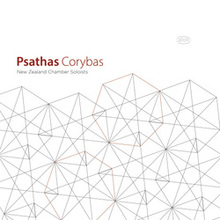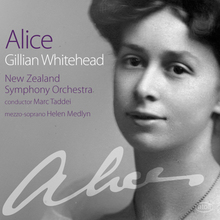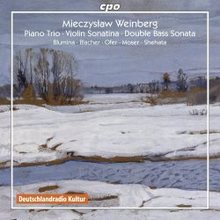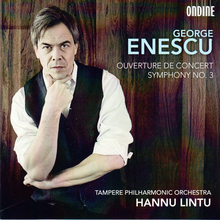Robert Johnson reviews recent releases by New Zealand and Eastern European composers this week. The New Zealand Chamber Soloists have a new recording of John Psathas, and the compelling monodrama Alice by Gillian Whitehead is featured. You'll also hear a disc of chamber music by Russian/Polish composer Mieczyslaw Weinberg, and the Tampere Philharmonic conducted by Hannu Lintu perform George Enescu's Third Symphony.
 PSATHAS: Corybas; Quintet; Helix; Aegean; Island Songs
PSATHAS: Corybas; Quintet; Helix; Aegean; Island Songs
New Zealand Chamber Soloists
(Atoll ACD 542)
Two works for piano trio receive their world premiere recordings on this disc – the vibrant Corybas, which gives its name to the album as a whole, and Aegean, its tranquil companion. Aegean is like a Greek counterpart to one of those slow, smoky tangos by Piazzolla and I can imagine it becoming quite a hit. This recording of chamber music with piano by John Psathas is outstanding in every way. It’s a particularly strong and varied programme, all works are given passionately committed performances, and it’s very well recorded to boot.
 WHITEHEAD: Alice; Karohirohi; the impossible ordered dance
WHITEHEAD: Alice; Karohirohi; the impossible ordered dance
Helen Medlyn (mezzo), Carolyn Mills (harp), New Zealand SO/March Taddei
(Atoll ACD 613)
Helen Medlyn encompasses a wide range of expression throughout Whitehead’s monodrama Alice. This is a perfectly realised performance of one of Whitehead’s most riveting scores, beautifully recorded. In The improbable ordered dance, Whitehead captivates the listener with the originality and strength of her ideas, and with her extraordinary command of every aspect of orchestral writing. This is a marvellous disc, one of the most intriguing examples of contemporary New Zealand orchestral music to have been produced in recent years.
 WEINBERG: Piano Trio; Violin Sonatina; Double Bass Sonata
WEINBERG: Piano Trio; Violin Sonatina; Double Bass Sonata
Elisaveta Blumina (piano), Kolja Blacher (violin), Erez Ofer (violin), Johannes Moser (cello), Nabil Shehata (bass)
(CPO 777 804)
Weinberg’s inventiveness and craftsmanship are such that his music doesn’t suffer by comparison with that of his mentor, Shostakovich. There can hardly be a better demonstration of the capabilities of these musicians than the second movement of the Piano Trio, a fearsome Toccata in 5/16 time, while the grief-stricken third movement, “Poem”, brings a particularly intense performance. All three of these musicians have had a long association with the music of this composer, and it shows in the commitment and concentration of their performance.
 ENESCU: Symphony No 3; Concert Overture on popular Romanian Themes
ENESCU: Symphony No 3; Concert Overture on popular Romanian Themes
Tampere Philharmonic/Hannu Lintu
(Ondine ODE 1197)
Enescu’s Concert Overture could almost be a Third Romanian Rhapsody, though both style and content are rather more sophisticated. Composed in Romania in the midst of the First World War, his Third Symphony is in three large-scale movements and doesn’t follow a traditional sonata-form design, instead it has a continuous transformation of themes. In the slow finale with its wordless chorus, Enescu attempts to transcend the violence and turbulence of this movement by affirming a belief in higher values that can’t be destroyed by war. This is undoubtedly the finest performance of this work currently available, and the recording is both opulent and well-defined.

